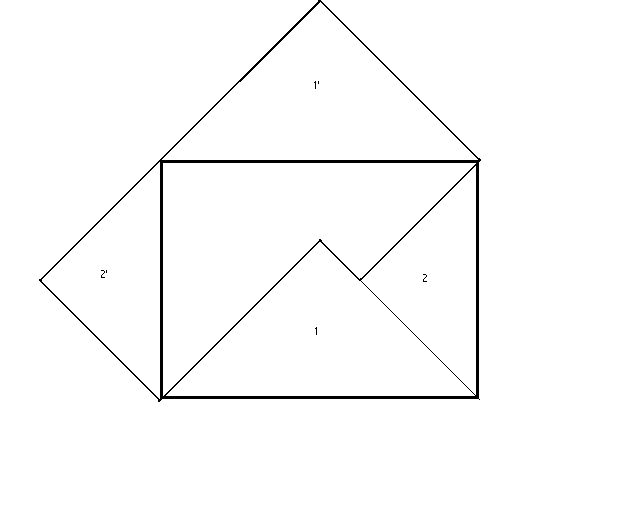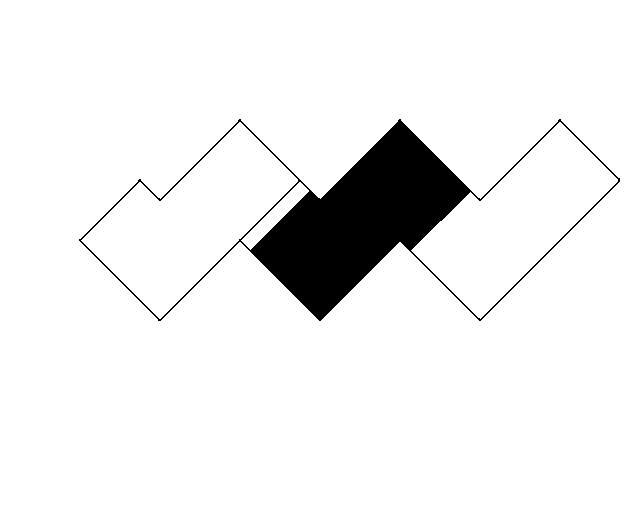[Freeciv-Dev] Re: (PR#3936) introducing native coordinates
[Top] [All Lists]
[Date Prev][Date Next][Thread Prev][Thread Next][Date Index] [Thread Index]
This is another way to generate a compact pattern aligned with the target
axes. It is basically a flavour of the first case but presented as a
slightly different set of just two cuts.
To generate the first case this way, one takes slightly less than a full
side width, and then does fixup cuts to fill in the residual triangular
holes.
The 4th bitmap shows how the "L" shaped normal sets wrap in one
dimension. The solid colour region is an "N" shape that shows how an
"L" becomes an "N", then back to an inverted "L", then inverted "N"
and finally an "L" as the origin point of the leading edge is changed.
The fact that a rectangular normal set produces an "L" or "N" shaped
normal set in a compact pi/4 rotated view is a result of the differing
lengths of the sides of the rectangle. A square map would produce a
pure diamond (aka rotated square in the target view).
Cheers,
RossW
=====
Ross Wetmore wrote:
As a primer ...
[...]
Personally, I found it instructive to understand the process here
visually, and
thus drawing graphs and doing a geometric mapping operation on paper
helped me
to verify all the subtleties of the code conditions. The comments tell
you how
to do this and the result to look for in the simple 1-D wrapping case
(the
normal set rectangle gets mapped to a parallelogram to remain within
the positive
region of the target axes) as well as the full 2-D one.
Geometrically, every point (above/)below a diagonal line through the
origin is
wrapped to the other end of the rectangle to create a parellelogram in
the simple
case. Points below that diagonal line would be negative in the output
coordinate
system. This is a vector operation (bounded by a diagonal line) rather
than a
simple single coordinate "+ map.xsize" operation because the
transformation is
a linear combination of coordinates rather than an independent
function of each
coordinate separately as in the parellel wrap axes case.
For the 2-D case you just need to juggle more mental balls because you
wrap in
two diagonal/vector steps, but the logic is the same.
[...]


- [Freeciv-Dev] Re: (PR#3936) introducing native coordinates, (continued)
- [Freeciv-Dev] Re: (PR#3936) introducing native coordinates, Ross Wetmore, 2003/04/26
- [Freeciv-Dev] Re: (PR#3936) introducing native coordinates, Ross Wetmore, 2003/04/24
- [Freeciv-Dev] Re: (PR#3936) introducing native coordinates, Raimar Falke, 2003/04/24
- [Freeciv-Dev] Re: (PR#3936) introducing native coordinates, Jason Dorje Short, 2003/04/24
- [Freeciv-Dev] Re: (PR#3936) introducing native coordinates, Ross Wetmore, 2003/04/26
- [Freeciv-Dev] Re: (PR#3936) introducing native coordinates, Ross Wetmore, 2003/04/27
- [Freeciv-Dev] Re: (PR#3936) introducing native coordinates, Ross Wetmore, 2003/04/27
- [Freeciv-Dev] Re: (PR#3936) introducing native coordinates,
Ross Wetmore <=
- [Freeciv-Dev] Re: (PR#3936) introducing native coordinates, Ross Wetmore, 2003/04/16
- [Freeciv-Dev] Re: (PR#3936) introducing native coordinates, Jason Dorje Short, 2003/04/14
- [Freeciv-Dev] Re: (PR#3936) introducing native coordinates, Raimar Falke, 2003/04/14
- [Freeciv-Dev] Re: (PR#3936) introducing native coordinates, Ross Wetmore, 2003/04/16
- [Freeciv-Dev] Re: (PR#3936) introducing native coordinates, Jason Dorje Short, 2003/04/11
- [Freeciv-Dev] Re: (PR#3936) introducing native coordinates, Raimar Falke, 2003/04/11
- [Freeciv-Dev] Re: (PR#3936) introducing native coordinates, Jason Short, 2003/04/11
- [Freeciv-Dev] Re: (PR#3936) introducing native coordinates, Raimar Falke, 2003/04/11
- [Freeciv-Dev] Re: (PR#3936) introducing native coordinates, Ross Wetmore, 2003/04/09
- [Freeciv-Dev] Re: (PR#3936) introducing native coordinates, Jason Dorje Short, 2003/04/09
|
|